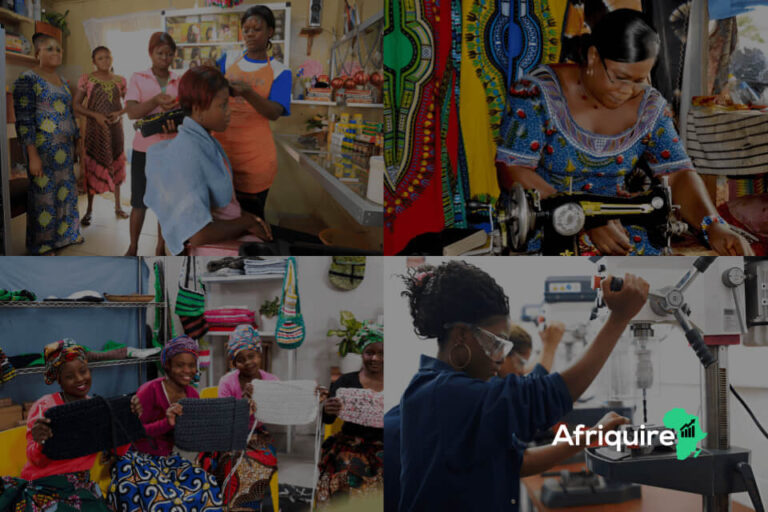Introduction
Africa’s biggest asset is its youth. They are critical to its future and can propel economic and social progress. What prospects does Africa’s future hold without youth empowerment?
This article will examine the importance of youth empowerment in Africa’s future. It aims to demonstrate that investing in the lives of young people is equivalent to investing in Africa’s future. We will explore strategies and opportunities to advance Africa, including education, entrepreneurship, leadership, and innovation. Are we prepared to unlock the untapped potential of Africa’s young and build a better tomorrow? Let us find out.
Introduction: The Role of Youth Empowerment in Africa’s Future
Africa is a continent with significant growth potential. As with any other society, its future is in the hands of its youth, a dynamic demographic that will alter the continent. But how can youth have the capacity to reshape the continent? Youth empowerment is the way forward, giving young people the opportunities, tools, and resources they need to generate change and creativity.
How equipped are African youths in leading sectors like technology, education and general governance? With the correct initiatives and support, they can take over industries. By investing in education, business, and leadership development, Africa can create a future where youths drive economic, social, and political growth.
Overview of Africa’s Young Population as a Critical Economic and Social Development Driver.
Africa’s young population is a powerful force for economic and social development. With over 60% of its population under 25, the continent has a vast talent pool, creativity, and energy. This youthful demographic brings opportunities for innovation, entrepreneurship, and labour force expansion, fueling economic growth. Socially, young people are key drivers of change, shaping cultural trends and advocating for sustainable development. Harnessing their potential through education, skill development, and employment opportunities will be crucial for Africa’s future.
The Potential of Youth as Innovators, Leaders, and Change-makers.
African youths have a lot of prospects of becoming innovators, leaders, and change-makers who can tackle the issues that face Africa. They are in a position to develop answers to the problems that surround them, such as unemployment, education, and healthcare, because of their immense inventiveness, tech savviness and entrepreneurial zeal.
When youths are given the right resources, education, leadership and opportunities, they can lead in industries like technology and agriculture. Empowering youths promotes short-term progress and long-term advances by preparing them for leadership roles in the future and utilizing their innovative and cutting-edge ideas.
Investments in Youth Empowerment to Harness Skills, Creativity, and Energy for Sustainable Growth.
Investing in youth empowerment is one way to secure any society’s future and drive long-term economic development. By providing access to education, skills training, mentorship and all other youth-focused initiatives, it would be easy to help youths tap into their hidden potential and make meaningful contributions to their society. Empowered youth are better equipped to innovate, create jobs, and solve pressing global challenges.
Moreover, fostering their creativity and entrepreneurial spirit leads to sustainable economic growth. Communities, corporations, and governments must collaborate to offer all the resources required to promote young development. Adequate investments targeted towards youth can enable today’s young to become tomorrow’s leaders, promoting advancement and creativity.

Key Areas of Impact for Youth Empowerment in Africa
Economic Growth and Entrepreneurship
Youth empowerment is one of the factors that is significantly influencing African economic growth and business development. By providing youngsters with all the resources they need to succeed, they are encouraged to think outside the box by introducing new business ideas and starting firms. This empowerment births the creation of jobs as startups typically generate employment opportunities and stimulate local economies.
Youths with an entrepreneurial spirit create economic dynamism by developing new products and services that improve market competitiveness and encourage economic growth. Investing in youth empowerment initiatives and entrepreneurship training helps to build a competent workforce, encourages young people to start their businesses, and drives sustainable development.
Education and Skills Development
Quality education, vocational training and digital literacy are essential educational programs that will aid in educating African youth for the future workforce. Quality education builds a solid foundation and aids in developing young people’s critical thinking and problem-solving abilities that they can apply in real-life situations. Vocational training is a step beyond standard schooling. They give young people valuable skills in targeted industries, improving their employability—including the capacity to work for themselves.
Digital literacy helps to build a more tech-savvy youth population. It ensures that young people can use technology to their advantage and develop new skills and career opportunities. These educational or training programs allow young people to compete domestically in Africa and abroad. By concentrating on these areas, Africa can develop a capable and flexible workforce prepared for both present and future opportunities.
Leadership and Governance
Youth play an important role in determining Africa’s political environment and governance. Their political participation will result in progressive change, with policies that address youth needs and ambitions. Civic involvement is another important area where young people may participate, from assisting in community projects to engaging in public discussions.
At both the local and national levels, youth leadership promotes creativity and diversity, bringing new viewpoints to existing government systems. Initiatives like Model United Nations will also help youths to understand how governance works and develop decision-making skills. By actively participating in these areas, young people influence decision-making and develop skills necessary for future leadership positions.
Technology and Innovation
Youths in Africa are major drivers of technological advancements and innovation, utilizing their abilities to develop answers to difficulties around them, transforming them into opportunities. Their contributions to these breakthroughs cover multiple industries and sectors, from app creation to the launch of tech companies. Young entrepreneurs have been able to create regional solutions that have evolved into solving global problems, such as mobile banking apps and agritech solutions, amongst others.
Examples of young entrepreneurs who have contributed to technology and innovation include:
- Iyinoluwa Aboyeji, co-founder of Andela and Flutterwave, was only 24 when he helped build two successful software startups focused on talent development and digital payments.
- Elizabeth Nyamayaro, 29, launched #HeForShe, which uses technology to improve gender equality.
- Sibusiso Moyo, a young Zimbabwean, founded TechZim, a platform that fosters tech innovation in Africa, at 22.
These examples demonstrate how young Africans are embracing technology and determining its future, pushing change and solving challenges through inventive solutions. African youth are altering the continent’s technology environment by leveraging their creativity and technical talents, establishing themselves as significant actors in the global economy.
Social Change and Community Development
Youth-led initiatives are crucial in Africa for social transformation and community development since they address critical social concerns while encouraging sustainability. By participating in local projects, young people help to improve community well-being and social advancement.
Young leaders are pioneering projects addressing education access, environmental protection, and health awareness. These projects frequently involve community clean-up campaigns, mentorship programs, and advocacy for legislation reforms.
For example, at 22, Peter Uzoho started Thrive Agric, which uses technology to empower farmers and increase agricultural productivity and sustainability. Another example is Copia Global, co-founded by Sarina Prabasi at 30. It employs a mobile platform to improve access to critical items in rural areas, supporting economic development and quality of life.
Health and Wellbeing
Youth empowerment plays a pivotal role in improving health status in Africa. By promoting mental health, young people can access help when necessary and destigmatize mental illness. Empowered youth do not only promote health but also drive health education initiatives. Youth-led campaigns that push for improved infrastructure and equipment make healthcare services more accessible.
Youth empowerment programs often focus on enhancing access to health care, ultimately leading to improved health services in neglected areas. Health educators who are young and have potential leadership skills can advocate prevention measures and healthy living practices, positively affecting the population’s health.
Strategies for Enhancing Youth Empowerment Across Africa
Investment in Education and Training
The quality of education and training must be improved to expand the benefits of youth empowerment throughout Africa. Developing educational infrastructure ensures that schools have access to necessary resources and technologies. Primary school scholarships and other financial aid programs can help less privileged children attend school, particularly higher and vocational training.
Market-oriented skill training programs are critical for providing young people with the essential skills to enter the labour force. Such programs should focus on skill development and business following the labour market and future job trends. Collaborations with local businesses can provide valuable hands-on experience and job prospects.
Supporting Youth Entrepreneurship
Providing access to capital and funding, mentorship, and company development resources is critical to encourage African youth entrepreneurship. For young entrepreneurs, financial support options include grants, microlending, and venture capital.
Mentorship programs help young individuals by connecting them with established business leaders’ networks. Business development guidance focuses on talent acquisition, market analysis, and business operating plans. These services cumulatively promote the creative young generation while also benefiting many others.
Policy and Legal Frameworks
Supportive policies and legal frameworks are essential for promoting youth empowerment throughout Africa. Governments should pass legislation to protect youth rights and ensure that they all have equal access to education and employment. Laws allowing for youth participation and representation should also be implemented. Creating legislation that encourages youth engagement in decision-making processes will give youths the confidence that they are not being ignored and that their voices are being heard.
Policies should also increase diversity by addressing gender, economic, and regional inequities. This strategy would foster an environment where youths could freely express themselves, thrive, and contribute to the continent’s progress.
Digital Inclusion and Access to Technology
Digital inclusion and access to technology are critical to empowering Africa’s youth. Providing tech education, a stable internet connection, and digital tools ensures that young people may enhance their abilities and spark innovation. By providing accessible internet, low-cost gadgets, and digital literacy initiatives, more young people may participate in the digital economy, increasing job opportunities and entrepreneurship, which is critical for Africa’s future.
Building Supportive Networks and Mentorship
Developing supporting networks and mentorship programs is critical to youth empowerment throughout Africa. These networks provide peer learning, collaborations, and skill development opportunities by connecting young people to industry professionals. Mentorship programs assist youngsters in navigating challenges, gaining confidence, and developing career skills.
By fostering a supportive environment, Africa’s youth can access resources and insights to help them succeed and contribute to their communities.
Promoting Gender Equality and Inclusivity
Gender equality and inclusivity are crucial for youth empowerment. Breaking barriers such as limited education, cultural norms, and financial constraints is key to female empowerment. Inclusive policies, mentorship, and resource access can ensure equal opportunities for all, especially marginalized groups. By breaking societal stereotypes, young women and other underrepresented groups can contribute to a more equitable society.

The Future of Youth Empowerment: Trends and Predictions
Rising Influence of Digital Platforms
Digital platforms are gradually opening up opportunities for youth empowerment. Through social media, young people have been able to build virtual communities and connections, share ideas and speak up about matters that concern them. Online learning platforms connect youths and teachers worldwide, giving them access to quality education, skill-building resources and exploring new career paths.
Also, the rise of e-commerce allows youths to explore entrepreneurial opportunities by creating a virtual marketplace to create and grow businesses without large capital investments. These digital platforms are breaking traditional barriers, offering youth the tools to succeed in a global economy and become agents of change in their communities.
The Shift Towards Green and Sustainable Job
The future of youth empowerment is strongly connected to the rise of green and sustainable jobs. As eco-friendly industries rise, young people take the lead in pushing the green economy forward. Jobs in renewable energy, waste management, and sustainable farming are becoming more appealing to the younger demographic who care about protecting the environment.
Governments and organizations are focusing more on these areas, giving young people chances to lead through new ideas and tech. By choosing green careers, young people can help create a more sustainable future while picking up valuable skills and finding job security in these growing fields.
Remote Work and the Gig Economy
Remote work and the gig economy have a huge impact on jobs for young people, giving them more choices and chances than ever before. When work hours are flexible, young workers can balance their personal lives with their jobs, which boosts their output and improves their attitude towards work. Working from anywhere lets young people apply for jobs worldwide and team up with people from different backgrounds, helping them build experience and connections.
The gig economy lets young people freelance in writing, design, and coding. This setup helps people with an entrepreneurial mindset and allows them to shape their careers around what they are good at and what they like. Also, it pushes a project-based way of working where people can tackle different tasks and build a wide range of skills.
Youth as Global Citizens
More young people in Africa are getting involved in movements due to better connectivity and digital platforms that allow them to join discussions about important topics like social justice, climate change, and technological advancements. The availability of platforms such as media and online education has broadened their exposure to ideas and prospects globally, which in turn nurtures a feeling of belonging to the global community. These youth shape matters by utilizing technology to push for social progress and develop innovative solutions.
Impact of Government and Private Sector Collaboration
Partnership between the government and private sector is key in expanding youth empowerment programs and bringing about big changes. The government helps with policies and money, while businesses add new ideas, resources, and ways to reach markets. Working together, they can create full programs that tackle education, job training, and starting businesses opening doors for young people. These partnerships allow for solutions that can grow and have lasting effects using what each side does best.
Evolving Skill Sets for Future Jobs
When we think about the future of youth empowerment, we see that some skills will become more valuable in the job market. Digital skills will matter most as technology keeps moving forward. Being good at coding, data analysis, cybersecurity, and anything tech-related will be key for many jobs across different fields. Also, critical thinking will be in high demand, as companies need people who can break down tough problems, make smart choices, and develop new solutions.
Adapting will also be important since technology changes so fast that workers must be flexible and ready to learn new skills. The ability to adjust to new tools and ways of doing things will play a big part in career growth and resilience.

Frequently Asked Questions (FAQs)
1. Why is youth empowerment important for Africa’s future?
It influences young people’s ability to push economic and social progress forward.
2. How does education play a role in youth empowerment?
Education gives youth the know-how and abilities they need to grow in their jobs.
3. What role does technology play in empowering youth?
Technology provides tools to learn, connect with others, and start businesses.
4. How can governments support youth empowerment?
Governments can back youth empowerment with policies, money, and initiatives focusing on schooling, skill-building, and creating jobs.
5. What challenges does youth empowerment face in Africa?
Youth empowerment in Africa struggles with scarce resources, poor infrastructure, and shaky politics.
Conclusion
The role of youth empowerment in Africa’s future has a revolutionary effect. It unlocks the younger generation’s ability to spearhead economic and social shifts. When young people gain power, they can spark new ideas, boost leadership, and open doors to progress.
To get the most out of these advantages, there is a need to tackle issues like limited resources and gaps in infrastructure. With focused help and funding, empowering young people can make a big difference in creating a prosperous and lasting future for Africa.



